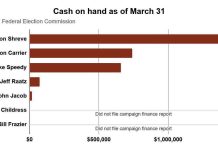AN emergency dispatcher who has been on the job for seven months is being credited with saving a life when he used text messaging to help a woman being threatened with a gun in a domestic violence incident.
Dylan Prather was at his desk in Bartholomew County’s Emergency Operations 911 Center just after 4 a.m. Monday when he received this particular 911 call. When he answered, “911, what is your emergency?” the woman did not respond but said in the background, “Put your gun away.”
As Prather asked again how he could help, he used the GPS feature of the phone to determine the woman’s location and sent Bartholomew County Sheriff’s deputies to the Elizabethtown home.
He then left the voice line open but began to text the woman over the next several minutes, asking if she was OK and whether she could talk. The woman disconnected the voice line, but Prather kept the texting going, and the woman texted back that the man had put the gun down but was not stable.
Prather texted again, asking for the man’s name and the type of gun. The woman provided the man’s name, that he had a 12-gauge shotgun and the address. She also texted, “He is still saying he is going to kill me.”
Deputies arrived at 4:09 a.m., about the time of the woman’s final text to Prather, and arrested Joshua M. Hehman, 32, Elizabethtown, on a charge of domestic battery while in the presence of a minor. The woman was not injured, sheriff’s deputies said.
While Prather was texting the woman, he was also providing information to the deputies about the situation they were approaching.
Ed Reuter, director of the emergency operations center, said voice communication is almost always preferred when dispatchers are handling a 911 call, but what Prather heard on the open phone line made his decision to text a crucial one in helping the woman.
“Dylan did an exceptional job,” he said of the dispatcher, a 20-year-old IUPUC student who hopes to be a police officer one day.
Prather’s presence of mind to leave the voice line open but to initiate texting, while locating the call’s location and helping deputies ascertain what they were approaching, led to saving the woman’s life, Reuter said.
“What Dylan did prevented serious bodily injury or death,” Reuter said.
Prather said he did experience an adrenaline rush when he realized someone’s life was at stake.
“I knew it was a serious call,” Prather said. “That one right there had my heart going.”
There were a few moments when the woman did not return one of Prather’s texts right away, and he said it was a pretty empty feeling as he worried that something had happened to her.
He said he mainly wanted her to stay calm and know that he had sent help to her.
National model
Text-to-911 program was a pilot program in Bartholomew County before being implemented in May 2014. It is now being used across the nation, requiring that each inbound 911 call or text — where no one is on the line or responds — will receive a text message back asking if emergency help is needed.Reuter said that explains why there are thousands more outbound texts than inbound. Each dispatcher must check to make sure the individual who contacted 911 did so by mistake or perhaps couldn’t speak but needed help.
“This Text-to-911 program has grown and grown,” Reuter said, describing it as the future of emergency services.
As many as 48,000 vehicles pass through Bartholomew County each day, and many of those people are carrying cellphones, he said. When you add the 79,000 people who live in the county to that total, the potential for texting to become vital in emergencies is apparent, he said.
Prather has not been able to talk to the woman he helped and said he doubts that he will because it was such a difficult situation that involved domestic violence. But he said it is enough to know that she is OK.
Reuter said many people might not realize that between when a 911 call is initiated and the time police officers, firefighters or an ambulance arrives, the lifeline to the victim is the dispatcher.
Each dispatcher is in a room at the emergency operations center in front of a grouped set of computer screens, directing voice and text traffic to get help to people, Reuter said.
Dispatchers are assigned to work with city police, firefighters and county sheriff’s department and fire departments and pick up each others’ calls as necessary when a dispatcher is busy. When the phone rings, the goal is for the call to be answered in fewer than 10 seconds, Reuter said.
A dispatcher is reaching out at a person’s most fragile moment, Reuter said. And a dispatcher’s decisions are vital, not just for the victim but for the police and firefighters who are trying to help.
In this particular case, everything went as it should and the woman survived, and no one was injured, Reuter said.
“When I talk to folks about what dispatchers do, I tell them that in the six or seven minutes a dispatcher might be dealing with a situation, it’s the most critical moments of someone’s life,” Reuter said. “And it can be some of the most brave moments of their life,” he said. “That’s why the decisions are so critical.”
[sc:pullout-title pullout-title=”About Text-to-911″ ][sc:pullout-text-begin]
Individuals who need emergency assistance are asked to dial 911 in a regular voice call. If no one is on the line when the 911 dispatcher answers the call, however, a texting link will be established to determine if emergency help is needed.
Dispatchers have pre-prepared texts with questions that allow dispatchers to quickly ascertain if there is an emergency and what help is needed. The dispatchers have the ability to text a question, or may use the pre-programmed questions to obtain information.
[sc:pullout-text-end][sc:pullout-title pullout-title=”Pull Quote” ][sc:pullout-text-begin]
“What Dylan did prevented serious bodily injury or death.”
— Ed Reuter, director of Bartholomew County Emergency Operations 911 Center
[sc:pullout-text-end]




